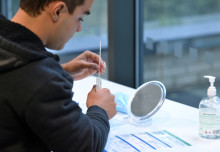

Partnership of Royal Brompton & Harefield and Imperial College London to lead new developments in heart and lung research<em> - News Release</em>
For immediate release
Wednesday 9 April 2008
The National Institute for Health Research (NIHR) has announced that a four-year grant worth at least £9 million has been awarded to the partnership of Royal Brompton & Harefield NHS Trust and Imperial College London to fund respiratory and cardiac Biomedical Research Units (BRUs) at the Trust. The Units will lead innovative research in respiratory and cardiovascular medicine, translating advances in medical research into benefits for patients and supporting the expansion of current research output in these priority areas of disease.
See also:
The Respiratory BRU will take the form of an Advanced Lung Disease Unit which will provide clinical core facilities to speed up translation of current therapies into benefits for patients, create six new Consortia in key advanced lung diseases to produce a significant step-change in future research capacity, and focus translational research towards the common endpoint of these advanced lung diseases, namely chronic lung failure. The six new Consortia are: severe COPD; asthma; chronic suppurative lung disease; sleep medicine; acute respiratory failure; and interstitial lung disease.
The Cardiovascular BRU, a Cardiac Regeneration Unit, will research into new treatments for the heart using genes, stem cells, tissue engineering and devices. A significant part of the research will be the establishment of cardiovascular genetics research working in close synergy with advanced cardiac imaging and cardiac Positron Emission Tomography (PET). This will develop a pipeline of discovery of new mechanisms of heart disease and new treatments. The imaging technologies will also be used to develop new techniques of delivering novel treatments (such as stem cells).
Commenting on the news, Bob Bell, chief executive of Royal Brompton & Harefield NHS Trust, said: "I am extremely pleased to see our research expertise recognised by this significant commitment from the National Institute for Health Research. As the largest specialist heart and lung centre in the UK, responsible for many important developments in both cardiac and respiratory medicine, we are ideally placed to use this investment to support world-class research to the benefit of patients everywhere.
"Our patients know we give them the best possible treatment for their heart or lung conditions; this funding guarantees that the primary focus of our experts in these new Units will be discovering groundbreaking new ways of treating heart and lung disease, so the best possible treatment continuously improves."
Professor Steve Smith, Principal of the Faculty of Medicine, Imperial College London, commented: "We welcome this recognition of the quality of respiratory and cardiovascular clinical science at Imperial College, and look forward to working in close partnership with our colleagues at Royal Brompton and Harefield hospitals and with our own Trust to translate our discoveries into better healthcare for patients across west London."
-ends-
For further information please contact:
Joanna Parish
Head of media relations
Royal Brompton & Harefield NHS Trust
Direct dial: 020 7351 8672
Mobile: 07866 536 345
Email: j.parish@rbht.nhs.uk
Laura Gallagher
Press Officer
Imperial College London
e-mail: l.gallagher@imperial.ac.uk
Telephone: +44 (0)207 594 6702 or ext. 46702
Out of hours duty Press Officer: +44 (0)7803 886 248
Notes to Editors
1. Royal Brompton & Harefield NHS Trust is the largest specialist heart and lung centre in the UK and among the largest in Europe. In an independent guide to hospitals in England published in March 2008, the Trust was voted 'best heart hospital'. www.rbht.nhs.uk
2. About Imperial College London
Imperial College London - rated the worldâs fifth best university in the 2007 Times Higher Education Supplement University Rankings - is a science-based institution with a reputation for excellence in teaching and research that attracts 12,000 students and 6,000 staff of the highest international quality. Innovative research at the College explores the interface between science, medicine, engineering and business, delivering practical solutions that improve quality of life and the environment - underpinned by a dynamic enterprise culture. Website: www.imperial.ac.uk
3. In August 2007, the National Institute for Health Research (NIHR) issued a call for proposals from NHS/University partnerships to establish BRUs in six 'priority disease areas', including (separately) cardiovascular and respiratory disease. Each BRU designation will be for four years and attracts NIHR funding of up to £1 million pa (£750k in year 1), plus up to £2 million of capital investment. In total, therefore, each BRU could attract up to £5.75 million of NIHR funds over four years.
4. The Respiratory BRU submission was led by Professor Eric Alton, professor of respiratory medicine and gene therapy, Imperial College and honorary consultant, Royal Brompton Hospital; Dr Mark Griffiths, consultant physician, Royal Brompton Hospital and honorary senior lecturer, Imperial College; and Professsor Michael Polkey, consultant physician, Royal Brompton Hospital and professor of respiratory medicine, Imperial College.
The Respiratory BRU will take the form of an Advanced Lung Disease Unit which will provide clinical core facilities to speed up translation of current therapies into benefits for patients, create six new consortia in key advanced lung diseases to produce a significant step-change in future research capacity, and focus translational research towards the common endpoint of these advanced lung diseases, namely chronic lung failure. The six new consortia are: severe COPD including pulmonary rehabilitation, severe asthma including childhood wheeze and allergy, chronic suppurative lung disease including gene therapy for cystic fibrosis, sleep medicine including sleep studies, acute respiratory failure including ARDS, interstitial lung disease including pulmonary fibrosis.
5. The Cardiovascular BRU submission was led by Professor Dudley Pennell, director of cardiovascular MR unit Royal Brompton Hospital, Professor Michael Schneider, director of cardiovascular science at Imperial College and cardiovascular strategic theme leader, and Dr Emma Birks, consultant cardiologist at Harefield Hospital with 11 years experience of managing severe heart failure. It proposes the creation of a Cardiac Regeneration Unit, which will build research capacity by:
* Developing new cardiac regeneration treatments;
* Establishing cardiovascular genetics infrastructure at both sites;
* Creating new biobank capacity for imaging, tissue, serum, cells and DNA;
* Exploiting links with the cardiovascular genomics strengths of Imperial College;
* Installing 3T Cardiac Magnetic Resonance (CMR) capacity for phenotyping cardiovascular diseases;
* Developing new cell delivery and assessment techniques using CMR and Positron Emission Tomography (PET) technologies.
Article text (excluding photos or graphics) available under an Attribution-NonCommercial-ShareAlike Creative Commons license.
Photos and graphics subject to third party copyright used with permission or © Imperial College London.





